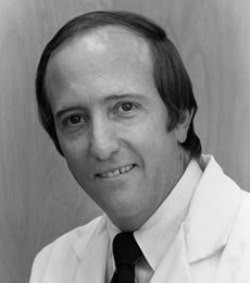 B. FRANK POLK, M.D., Sc.D., was born in San Angelo, Texas. He received his BA from the University of Texas in 1963, his M.D. in 1967 from the Baylor College of Medicine, and his Sc.D. in 1976 from the Harvard University School of Public Health.
B. FRANK POLK, M.D., Sc.D., was born in San Angelo, Texas. He received his BA from the University of Texas in 1963, his M.D. in 1967 from the Baylor College of Medicine, and his Sc.D. in 1976 from the Harvard University School of Public Health.
A brilliant researcher and compassionate humanitarian, Dr. Polk directed the AIDS outpatient clinic at the Johns Hopkins Hospital, where he treated hundreds of AIDS patients. Complementing his service at the Hospital, he helped to establish an AIDS hospice at the Joseph Richey House in Baltimore.
Trained in epidemiology and infectious disease, Dr. Polk not only dedicated himself to teaching, but also used innovative, creative approaches to solve clinical problems with epidemiological methods. At the start of the AIDS epidemic, he recognized the need for epidemiological research on what was, at the time, a mysterious disease. He soon became an internationally acclaimed leader in AIDS research. In the 1980s he founded two major cohort studies — the Study to Help the AIDS Research Effort (SHARE) as part of the Multicenter AIDS Cohort Study (MACS), and the AIDS Link to Intravenous Drug Experience (ALIVE) — both of which were so essential and pioneering that they are still active.
In 1986, Dr. Polk was awarded a Fogarty Center grant that continues to train HIV investigators from around the world. Dr. Polk’s legacy will continue through the B. Frank and Kathleen Polk Assistant Professorship within the Department of Epidemiology. The endowment will support junior faculty within the Department of Epidemiology who show great potential for future contributions to public health.
Held by Eshan Patel
 Dr. ESHAN PATEL draws from his expertise in infectious disease epidemiology, hematology, and virology to conduct research on COVID-19, HIV, viral hepatitis, and other sexually transmitted infections. He also works with vulnerable, high-risk populations in the US, India, and Uganda, including injection drug users and transgender communities. His current research focuses on understanding and addressing social and structural determinants of infectious disease transmission, risk, and prevention, including patient engagement in prevention and treatment services. With high-level laboratory experience in developing and evaluating diagnostic blood tests, Dr. Patel has conducted numerous studies of the patterns of and risk factors for infectious diseases associated with blood transfusion as well as male circumcision. Over the past decade, he has collaborated with the AIDS Linked to the IntraVenous Experience (ALIVE) study of current and former people who inject drugs in Baltimore, Maryland, as well as the non-profit organization YR Gaitonde Centre for AIDS Research and Education (YRG CARE) to conduct epidemiologic studies with priority populations across India.
Dr. ESHAN PATEL draws from his expertise in infectious disease epidemiology, hematology, and virology to conduct research on COVID-19, HIV, viral hepatitis, and other sexually transmitted infections. He also works with vulnerable, high-risk populations in the US, India, and Uganda, including injection drug users and transgender communities. His current research focuses on understanding and addressing social and structural determinants of infectious disease transmission, risk, and prevention, including patient engagement in prevention and treatment services. With high-level laboratory experience in developing and evaluating diagnostic blood tests, Dr. Patel has conducted numerous studies of the patterns of and risk factors for infectious diseases associated with blood transfusion as well as male circumcision. Over the past decade, he has collaborated with the AIDS Linked to the IntraVenous Experience (ALIVE) study of current and former people who inject drugs in Baltimore, Maryland, as well as the non-profit organization YR Gaitonde Centre for AIDS Research and Education (YRG CARE) to conduct epidemiologic studies with priority populations across India.
As an MPH and doctoral student at the Bloomberg School, Dr. Patel was a graduate research assistant in Epidemiology and in the School of Medicine Department of Pathology Division of Transfusion Medicine. After completing NIH predoctoral research awards from NIDA and NIAID, he was appointed assistant professor in Epidemiology in September 2024.
Dr. Patel has published 100 papers, 35 as first author, including two Editor’s Choice articles in the Journal of Infectious Disease. He received his BS in biology and psychology from Washington College, an MPH from Johns Hopkins Bloomberg School of Public Health, and a PhD in epidemiology from the Bloomberg School.
Dr. Patel is a phenomenal collaborator and mentor who is well qualified to advance the research and teaching mission of our School and the Department of Epidemiology.
 B. FRANK POLK, M.D., Sc.D., was born in San Angelo, Texas. He received his BA from the University of Texas in 1963, his M.D. in 1967 from the Baylor College of Medicine, and his Sc.D. in 1976 from the Harvard University School of Public Health.
B. FRANK POLK, M.D., Sc.D., was born in San Angelo, Texas. He received his BA from the University of Texas in 1963, his M.D. in 1967 from the Baylor College of Medicine, and his Sc.D. in 1976 from the Harvard University School of Public Health.